5 Keys to Buying a Property Abroad
Purchasing Your Piece of Paradise
Article and photos by Jonathon
Engels
12/2/2015
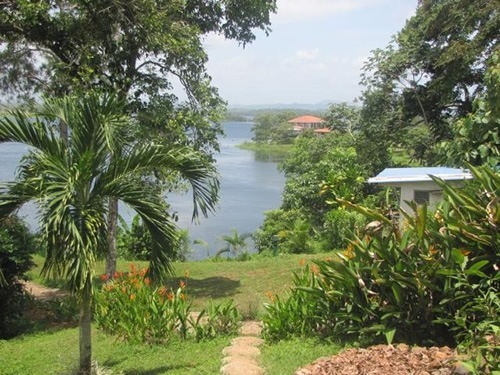 |
| A garden view of a nice place in Panama. Emma and I lived there for nearly a year, starting a food forest and establishing edible gardens. We loved our time there, but the area and community just didn’t match our hopes for a permanent home. |
All in all, I’ve set up shop in about 10 or so different countries, hanging my hat on everything from a clanging radiator in urban Moscow to a protruding tree branch in the Nicaraguan jungle. Sometimes life abroad has worked out really well, and I’ve nestled into feeling at home without much difficulty. Other times, challenges have stacked up and I’ve counted the days until my departure (for years, I was an EFL teacher working on time-specific contracts). Living in a foreign country was often a roll of the dice and the numbers didn’t always land in my favor.
Experience has taught me that despite the best of intentions and respect for a culture, there is much more to moving abroad than simply choosing a spot and packing some boxes. Sure, you can manage such a spontaneous brand of relocation (and I have on more than one occasion), but when it comes to making a choice that will be more permanent, settling in a place for more than a few months or a year, it’s far better to use a little extra caution. Remember, this is your life and also an opportunity to go about it the right way, so you should choose a place that makes sense for you rather than relying on chance.
As a matter of fact, my wife and I have decided that we are looking to stop changing the countries in which we live every year or so. We intend to settle for a spell, cultivate a little plot of land, and make a home in a new location. Luckily for us, we’ve already made a lot of mistakes and experienced life in a variety of different places, so we know the gravity of this choice. Perhaps we are feeling the importance of this decision even more than those who haven’t traveled as much. That is why, this time, we aren’t just spontaneously showing up somewhere to carve out a new life.
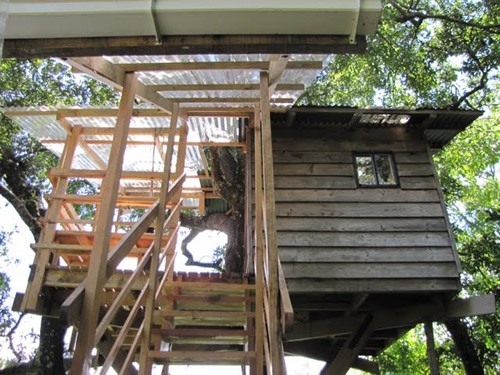 |
| The famous Tree House at Earth Lodge, a Guatemalan eco-hotel where my wife and I have worked for a total of about four years. It’s typically reserved months in advance, and visitors think it is an incredible place to live. |
1. Decide where and what you are looking for before you start the relocation process. No need to be sidetracked by some location or property that doesn’t truly fit the new life you’re after.
In the past, when we were teaching, we would often choose our destinations based on somewhat arbitrary considerations. We moved to Moscow because Emma had studied sociology and was interested in the history of communism. We first moved to Guatemala City because it was one of only a few viable choices for us in Central America, and seemed far more interesting than the numerous options in Mexico. In both instances, we ended up counting down to the contract completion. Just because a location seems enticing doesn’t mean that living there will match your idealized vision.
Now that we are looking for something permanent, we’ve gone through brainstorming sessions to figure out what we want in terms of size, price, climate, community, location, features, landscape, and other particulars. The list we created has served us well as guidance when filtering out an assortment of interesting, but nonetheless ill-suited (for us) properties. Establishing what you want before you start searching helps streamline the process. It prevents settling for less or spending more, though you always have to steer clear of temptations. Buying property is a much bigger undertaking than simply moving to a new location.
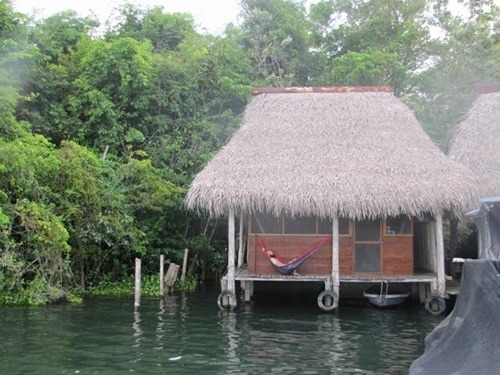 |
| We lucked out while looking for land in Guatemala and made a connection that led to us living in this rustic riverside cabin for $125 a month. Every morning I was able to work at a nearby hotel, drink complimentary coffee, and look out over the water. |
2. Buying property is not a race. Finishing first could spell disaster. Look around without a set timetable before settling on a new location or home.
Our search began as a casual affair. We started “keeping an eye out” on a trip from Guatemala to Argentina nearly two years ago. To be completely frank, this is much longer than it has to take. However, we had the time and the desire to travel, so why not consider as many options as possible? During this period, we’ve added several possibilities to the list of locations, lived in four different countries for several months, and wound up returning to the country where our trip began—Guatemala. Sure, the process involves a lot of time and exploration, but we’ve done so with no regrets. And, that’s how we plan to feel about the property we choose.
A slow traverse into the world of land ownership can both broaden and narrow the scope of what you desire. Sometimes you learn that the area you longed for is out of your price range should you want that dream property. In that case, you can move elsewhere, rent, and look around in a more affordable region. Or, maybe the properties do not turn out to be what you anticipated—the location may be too dangerous, developed, or rural. Buying something abroad is not the time to start making concessions that leave you feeling uncomfortable. Aren’t most of us moving abroad to find something astonishing? You are experiencing a transition where allowing for a little extra time can make a huge difference.
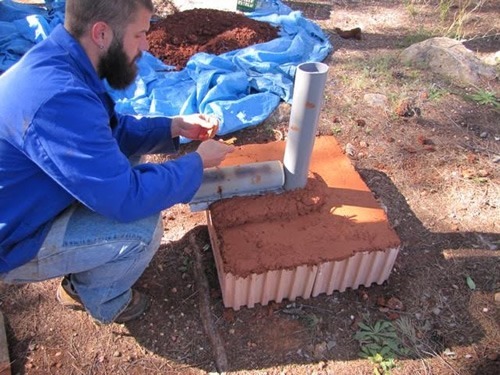 |
| We lucked out while looking for land in Guatemala and made a connection that led to us living in this rustic riverside cabin for $125 a month. Every morning I was able to work at a nearby hotel, drink complimentary coffee, and look out over the water. |
3. It’s better to experience and get a feel for life at a new location before making a commitment. No place is pure paradise, but all things considered, may turn out to be pretty blissful.
Truth be told, not finding the right property straight off has been a stroke of luck. Firstly, it made us explore more, as well as reconsider and test all of our wants and desires. Most of them held true, but some got shuffled around on the list. The more relevant benefit of our extended search, however, is that we are really getting a chance to experience life where we dwell in-depth. It’s like a test-run, a way of knowing much better what we are getting into, good and bad.
It’s easy when moving abroad, to become prematurely enamored with a place. In fact, it’s part of the normal progression of culture shock, and the only way to really move beyond it is to spend time in a place, and allow those little idiosyncrasies become part of a way of life rather than merely exciting quirks. It also gives you a chance to see what does and doesn’t work for you about a location. Everyone is seeking something a little bit different, and even if some other people may love their choice somewhere on earth, that doesn’t necessarily mean it’s the spot for you.
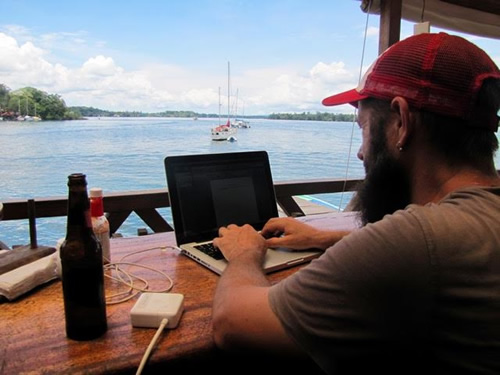 |
| Shopping for a property online is a great way to get a sense of what might available in a location, as well as the price range. However, there’s nothing like actually being there. Plus, you can still look around online at what might be more desirable listings or locations while growing accustomed to your current location. |
4. Shopping for international properties to buy online, with all the convenience, is more costly and limiting than browsing the local market in person. For many reasons, it just makes sense to be present where you plan to buy.
At the start of our search, we did a lot of legwork online. We’d pass through countries and regions that gained our interest — parts of Colombia, Ecuador, Costa Rica, and even Spain — and check out the local market. We compared parcels of land and their cost. Because we wanted to feel out our options, we made notes about the possibilities for later exploration. The big trick we’ve learned over time is finding local connections, networking with people who may have friends of friends who may have property for sale.
Local real estate markets are a much better bargain than international websites. Prices are generally far cheaper, and what’s available for purchase multiplies. Almost every part of every land now offers online classified listings and expat Facebook pages where you can hook up with others and find information. The hostels and restaurants we’ve frequented have been invaluable resources as well, both for local connections and as introductions into the immigrant web. Don’t be afraid to talk to people about your search. As with most places worldwide, word-of-mouth is still the most fruitful way to find out about hidden spots and the best deals.
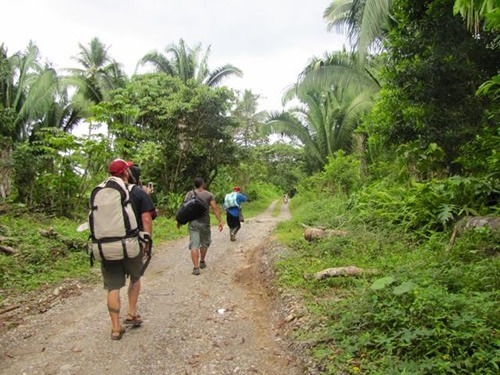 |
| In our case, we had the idea of living in a rural place. Visiting this village, a two-and-a-half bus ride from anything but jungle, pipeline, and plantations, helped us reevaluate exactly what we considered “rural” to mean. Sometimes things aren’t as romantic in reality (or realty) as they are in our minds. |
5. Your final choice before buying has got to work. If it doesn’t fit the budget, if doesn’t feel right even though you thought it would, if something seems off, just shrug and walk away.
Unlike our previous homes abroad, much more is at stake with the coming choice. It’s one that we hope to last for a long time. We’ve experienced highs and lows on our search, nearly bought properties and fell for locations well over our budget, but it’s all part of the learning process. Moving slowly, we believe, is key to making the most of our choices, and sometimes that involves giving up a place. We have all the while made time to prioritize our goals, establish ourselves as residents, and try out new routines—hoping that our plans and actions will make the transition from being a visitor to becoming an owner a smoother process.
Shrugging when it’s time to shrug, and walking away when appropriate is what wise investors do. Sometimes a beautiful piece of property doesn’t quite fit the bill, even though it fits the budget. Revisit your wish list and make sure that your rational requirements are met rather than being blindly enamored by a deal or a house or another appeal, thereby losing track of what really matters. Keeping the option to walk away from something sour can help avoid a bad purchase. When all your requirements line up, you’ll buy.
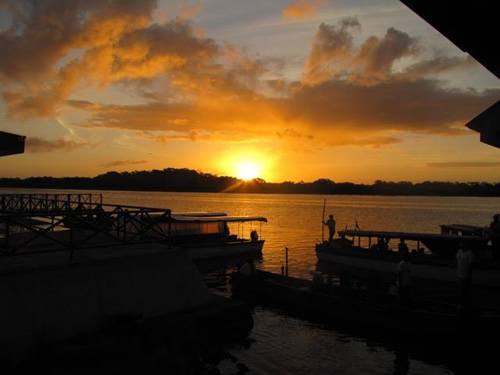 |
| Perhaps the best part of looking for land to buy has been the journey. Even if we never find a dream property, we’ve certainly found a heap of happiness and peace of mind in the process. |
Conclusion
For some people (ourselves included), there is a strong inclination to find a place to call home as quickly as possible and accelerate the process of living abroad, but the truth is that taking the time to look for the right match will have a huge impact on the end result. There are stories of people coming down for a trip and accidentally finding some dream property, and that does perhaps happen on occasion. But more often than not, as with most things in life, slow and steady along with planning and preparation allows you to satisfy your longer-term goals.
If it takes an extra six months or an extra year to find a place that keeps you happy for three decades to come, well, that’s six months or a year well spent. Besides, if you are following these guidelines, you’ll be traveling and living abroad during that time anyway, making the whole search a grand and exciting adventure. Isn’t that why you’re wanting to move abroad in the first place? So, keep in mind that finding an ideal property is all part of a much larger journey.
Here are some great resources to help you with your search:
|
 |
Jonathon
Engels earned an MFA in creative writing.
He has lived, worked and/or volunteered in seven
different countries, traveling his way through
nearly 40 countries between them. His many interests include permaculture, veganism, and ways to live sustainably.
|
|
